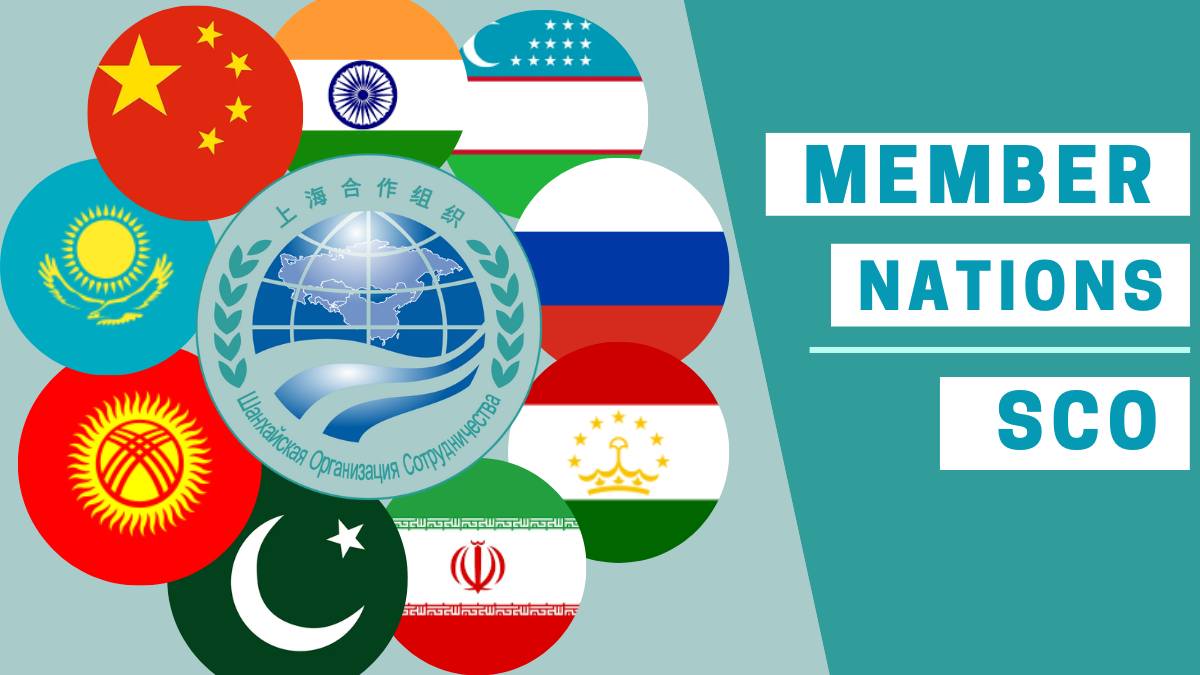Navigating India’s SCO Membership: Assessing Benefits, Challenges, and Future Prospects
Context:
- India’s membership in the has provided certain advantages and opportunities for the country. Shanghai Cooperation Organization (SCO)
- However, despite these benefits, the future prospects for India within the SCO are not promising.
Relevance:
GS-02 (Important International Institutions)
Prelims:
- Members of SCO
- It’s official language.
- Objectives and initiatives
Mains Questions:
- Analyze the implications of India’s SCO chairpersonship and its impact on India’s regional engagements. (150 words)
Shanghai Cooperation Organization (SCO)
- SCO is a permanent intergovernmental international organization established in 2001.
- It aims to maintain peace, security, and stability in the Eurasian region.
- The organization was originally known as the Shanghai Five, consisting of Kazakhstan, China, Kyrgyzstan, Russia, and Tajikistan.
- The Shanghai Five emerged from border talks between the former Soviet republics and China to ensure stability along the borders.
- In 2001, the Shanghai Five was renamed the SCO after the accession of Uzbekistan.
- India and Pakistan joined as members in 2017, and Iran announced its membership in 2021.
- The objectives of the SCO include strengthening mutual trust, promoting cooperation in various areas, and establishing a new international order.
- The organization has different councils, such as the Heads of State Council, Heads of Government Council, and Council of Ministers of Foreign Affairs, to handle various aspects of its functioning.
Dimensions of the article:
- India’s SCO Membership: A Strategic Move
- Regional Security and Connectivity: Key Priorities
- Multi-Alignment and Strategic Autonomy
- Challenges and Concerns
- Diminishing Returns and Future Outlook
India’s SCO Membership: A Strategic Move
- India’s inclusion as a full member of the SCO in 2017, alongside Pakistan, was a significant step in enhancing its geopolitical position.
- By joining this originally Eurasian group, India aimed to tap into the economic potential and address key regional challenges.
- The SCO comprises countries that collectively account for a substantial portion of global GDP, trade, oil reserves, and natural gas reserves.
Regional Security and Connectivity: Key Priorities
- The SCO’s focus on regional security and connectivity aligns with India’s goals for sustained growth.
- Addressing issues like terrorism emanating from Pakistan and Chinese assertiveness, as well as the Belt and Road Initiative, holds paramount importance for India’s national security and stability.
- Being an active participant within the SCO allows India to engage with Central Asian markets and resources, thereby opening new avenues for economic growth.
Multi-Alignment and Strategic Autonomy
- India’s decision to join the SCO was in line with its aspirations for “multi-alignment” and “strategic autonomy” on the global stage.
- As a balancing power, India sought to strengthen its position by diversifying its partnerships and alliances.
- The timing of India’s SCO membership coinciding with its entry into the revived Quad with the U.S., Japan, and Australia underscores the strategic significance of this move.
Challenges and Concerns
- While India’s SCO membership has yielded certain benefits, challenges and concerns remain.
- The decision to postpone and convert the SCO summit into a virtual event may have dampened its significance and affected the outcomes.
- India’s cautious approach can be attributed to various factors, such as the ongoing border tensions with China, concerns over Pakistan’s intentions, and the optics surrounding interactions with Russian President Putin.
Diminishing Returns and Future Outlook
- With India’s tenure as the SCO chairperson coming to an end, the country might experience diminishing returns from its SCO engagement. This could complicate its task of hosting the G-20 summit and dilute its influence within the SCO framework.
- The absence of consensus on crucial agreements, such as making English a formal SCO language and endorsing a road map on economic cooperation, raises questions about India’s ability to shape the SCO’s agenda in line with its own interests.
Way Forward:
To maximize the benefits of its SCO membership and mitigate future challenges, India needs to adopt a proactive approach. Strengthening diplomatic engagements, forging strategic alliances within the SCO, and effectively leveraging economic cooperation platforms will be crucial. India must prioritize the pursuit of its national interests while navigating the complexities of regional dynamics within the SCO framework.
Conclusion:
India’s membership in the SCO has provided it with opportunities to enhance regional cooperation, address security concerns, and expand economic engagements. However, the future of India’s SCO engagement remains uncertain, given the challenges and limitations it faces. To secure its position effectively, India must adopt a nuanced approach, balancing its interests with those of other member countries, while striving to assert its influence and contribute positively to the SCO’s objectives.





